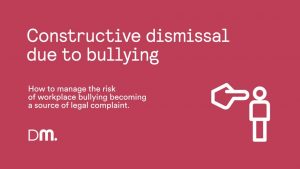Constructive Dismissal Definition – What Is a Constructive Dismissal?
Constructive Dismissal Definition
In employment law, constructive dismissal, also known as wrongful dismissal or constructive termination, happens when an employee quits on grounds of the employer creating a work environment that is abusive to that employee. It’s in effect, a dismissal because the resignation wasn’t really voluntary. For an example, if you’re working as a teacher and you are told by your principal that there will be a test the next week and that you’ll have to take it in front of some students, if you don’t show up for the test it could be considered a constructive dismissal. Essentially, if you don’t perform as well as expected in the test the principal feels justified in firing you. The same would go for an employee who is repeatedly kicked out of meetings or told they can’t contact their supervisor. A constructive dismissal is very different than a case of discrimination because in this instance the person quitting has actually been doing something wrong.
An employer must justify the termination of an individual. In order to do so, they need to show the employee either: There has been a negative action taken against them or that there has been a misunderstanding of the facts which has resulted in a negative work environment situation. Reasonable suspicion is the basis for many wrongful dismissals and can be proven by either the employer themselves or in court if the employee chooses to pursue court proceedings. If you’re being made to feel uncomfortable at work or your working conditions are causing you to have bad thoughts about your employer, then it could be the basis for a constructive dismissal.

Punitive damages, however, are not included in the constructive dismissal definition. Punitive damages are damages awarded to an individual for an actual instance of discrimination, such as gender, race, age, religion, sexual orientation, or disability. Punitive damages are often awarded in discrimination cases, but can also be used in situations where there is an actual false employment practice or sexual harassment. In this case, you will receive monetary damages, not an emotional one.
constructive dismissal toronto
Constructive Dismissal Definition – What Is a Constructive Dismissal?
The last part of the constructive dismissal definition is a summary of what you would have to be shown to have actually occurred in order for your case to stand up in court. Your employer has to be shown to have intentionally discriminated against you. They have to do this by having ill-fitted rules for your position, failing to give you a reasonable notice of promotion or increase, or having other employees discussing your job vacancy with other employees who may be upset at you. You will have to show how this behavior has harmed or will harm, your career or prospects. You may also have to show that the employer actually has a financial interest in keeping the policy in place, and they have a specific time period within which the policy has to end.
Constructive dismissal can occur in any employment contract between an employer and an employee. It cannot occur, however, in a term or wage agreement, nor with a potential employee for six months or more before the agreed upon termination of employment. It can only occur if there is a “notice of intent to dismiss” from either party. For an employee who believes their rights have been violated, they must immediately report their case to the nearest office of the Office of Legal Affairs and then immediately file a personal injury lawsuit against their former employer, along with a request for a legal determination of whether or not their constructive dismissal has been justified as per the contractual employment contract.
If you are an employee who believes that their employer was guilty of wrongdoing, you should seek counsel from an attorney experienced in this area of employment law. An attorney can review your case and discuss how the circumstances in question may impact upon you and whether or not you may have a case. If you do, your attorney can determine whether you have a legitimate claim for damages against your employer. A legal professional will review whether or not your employer’s actions amount to a constructive dismissal under the state or federal laws, and then determine if your damages should really be awarded as a result. A personal injury lawyer will consult with you and your lawyer and assist you throughout the entire litigation process.